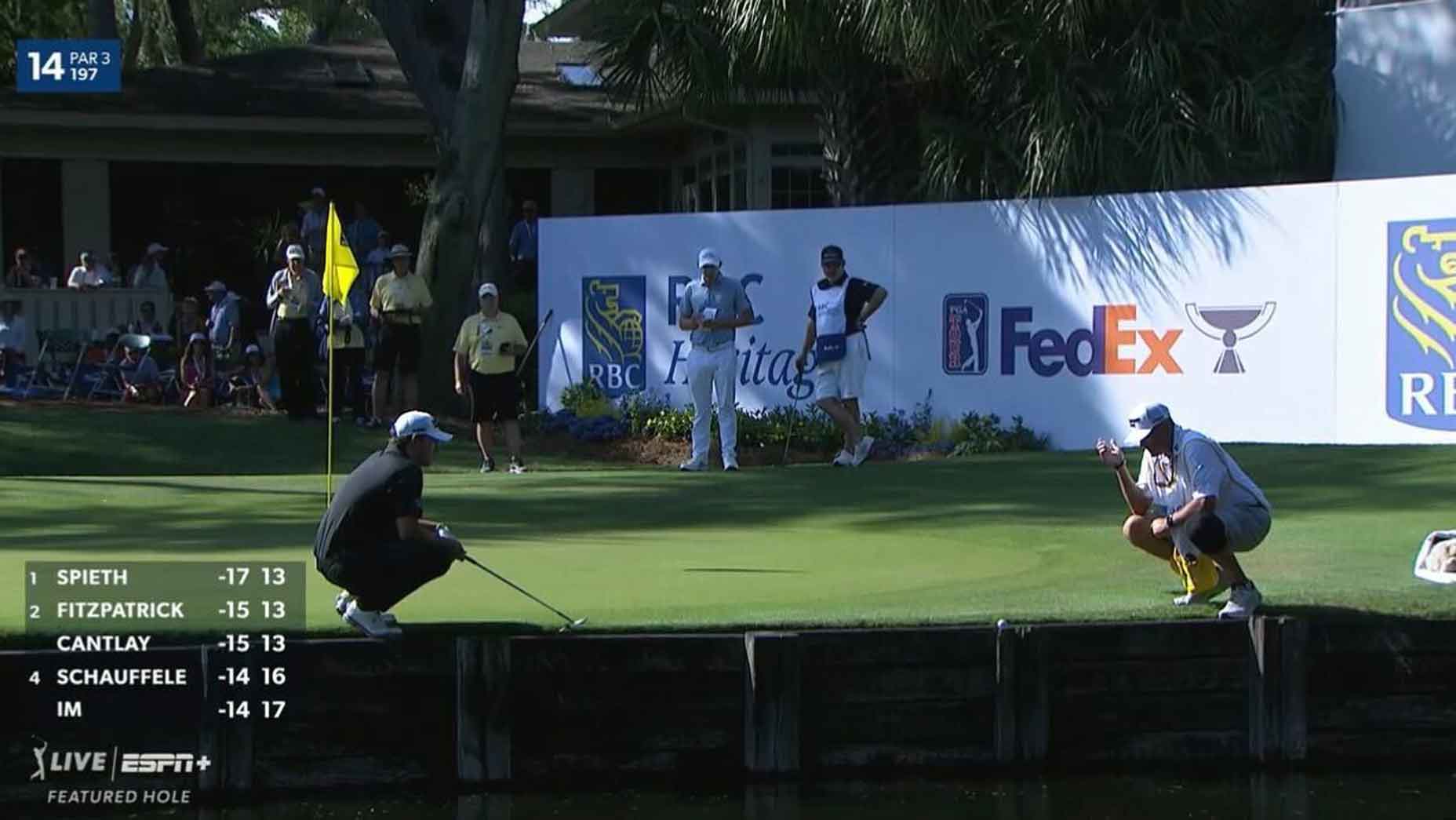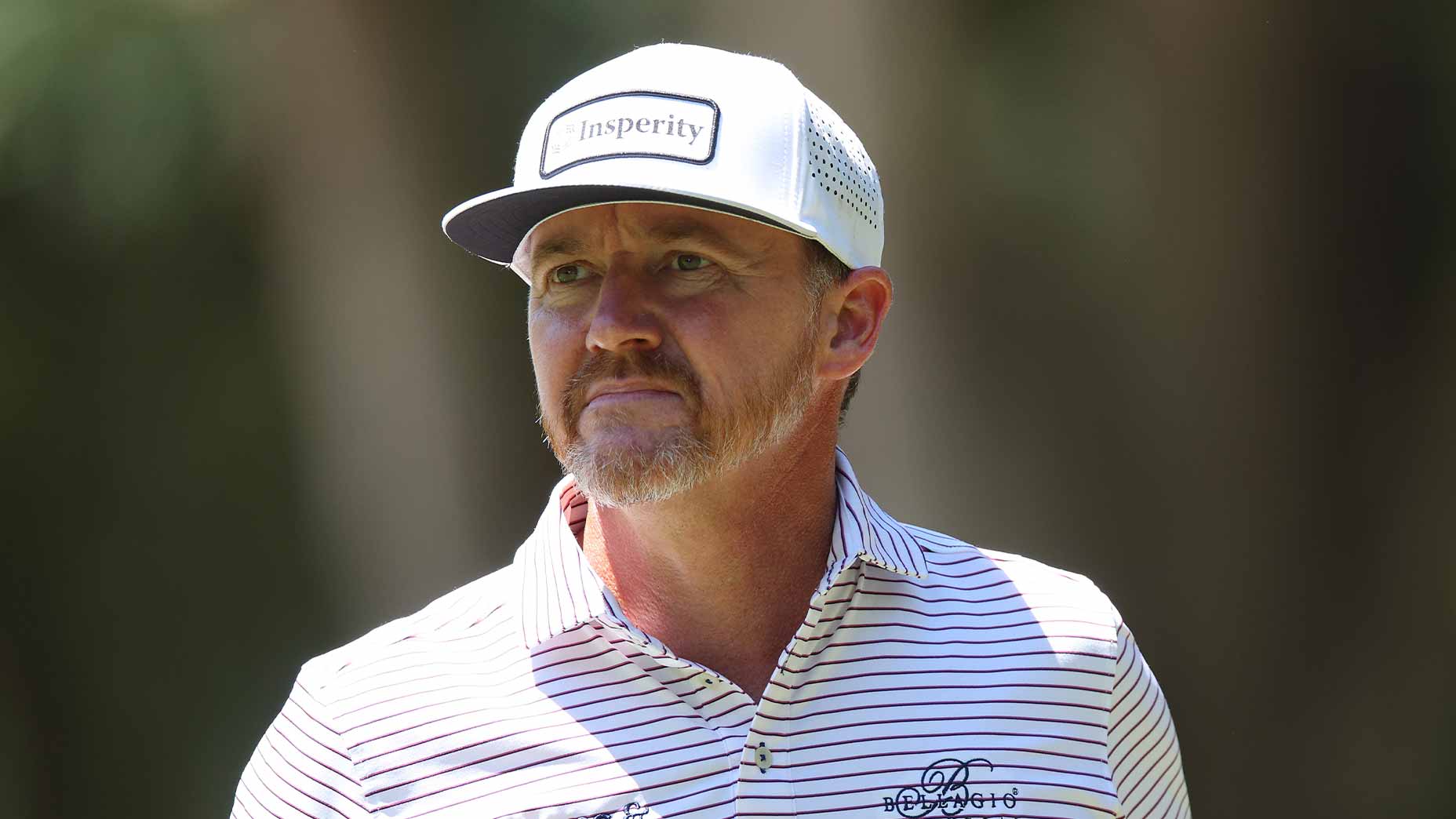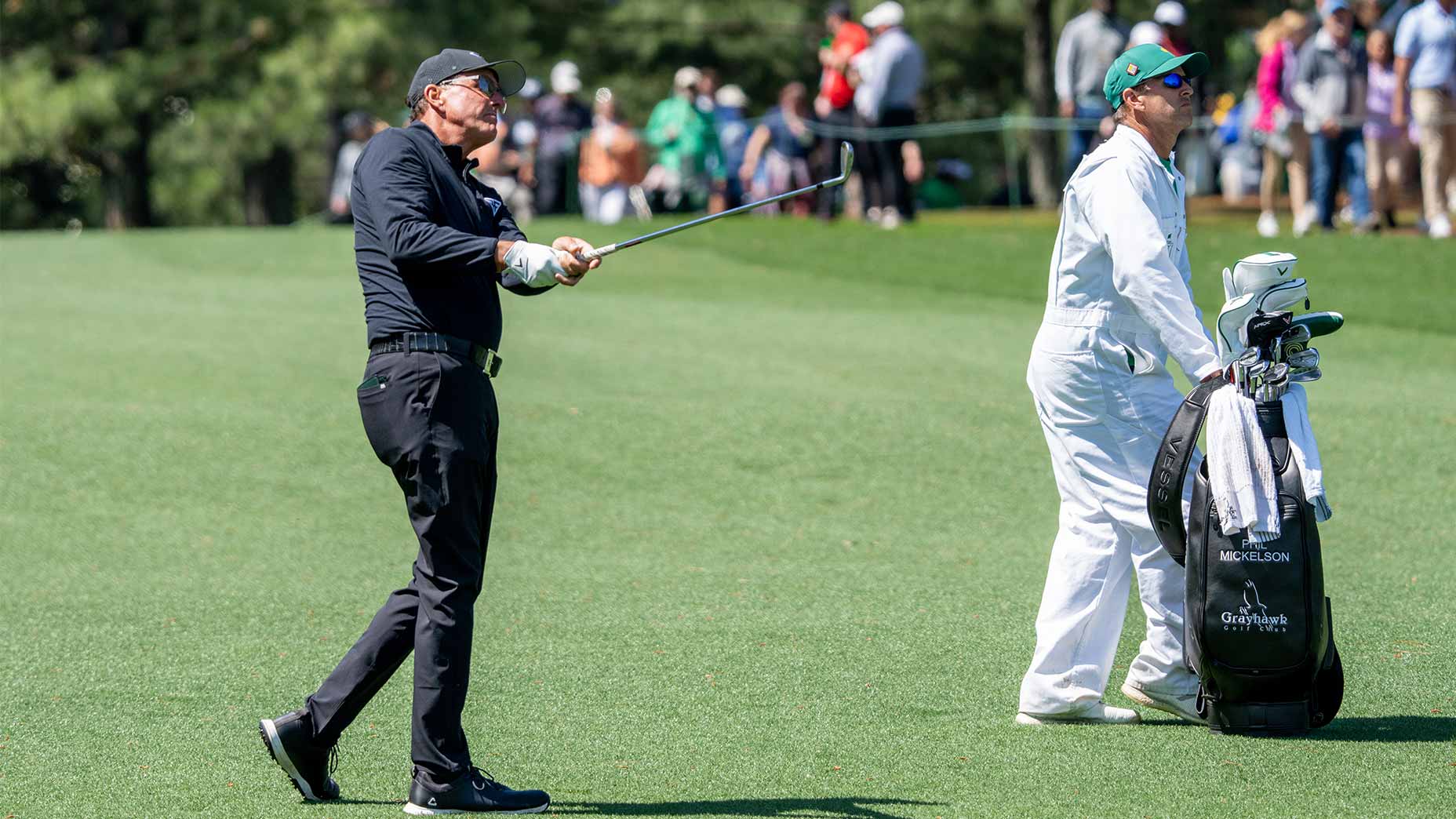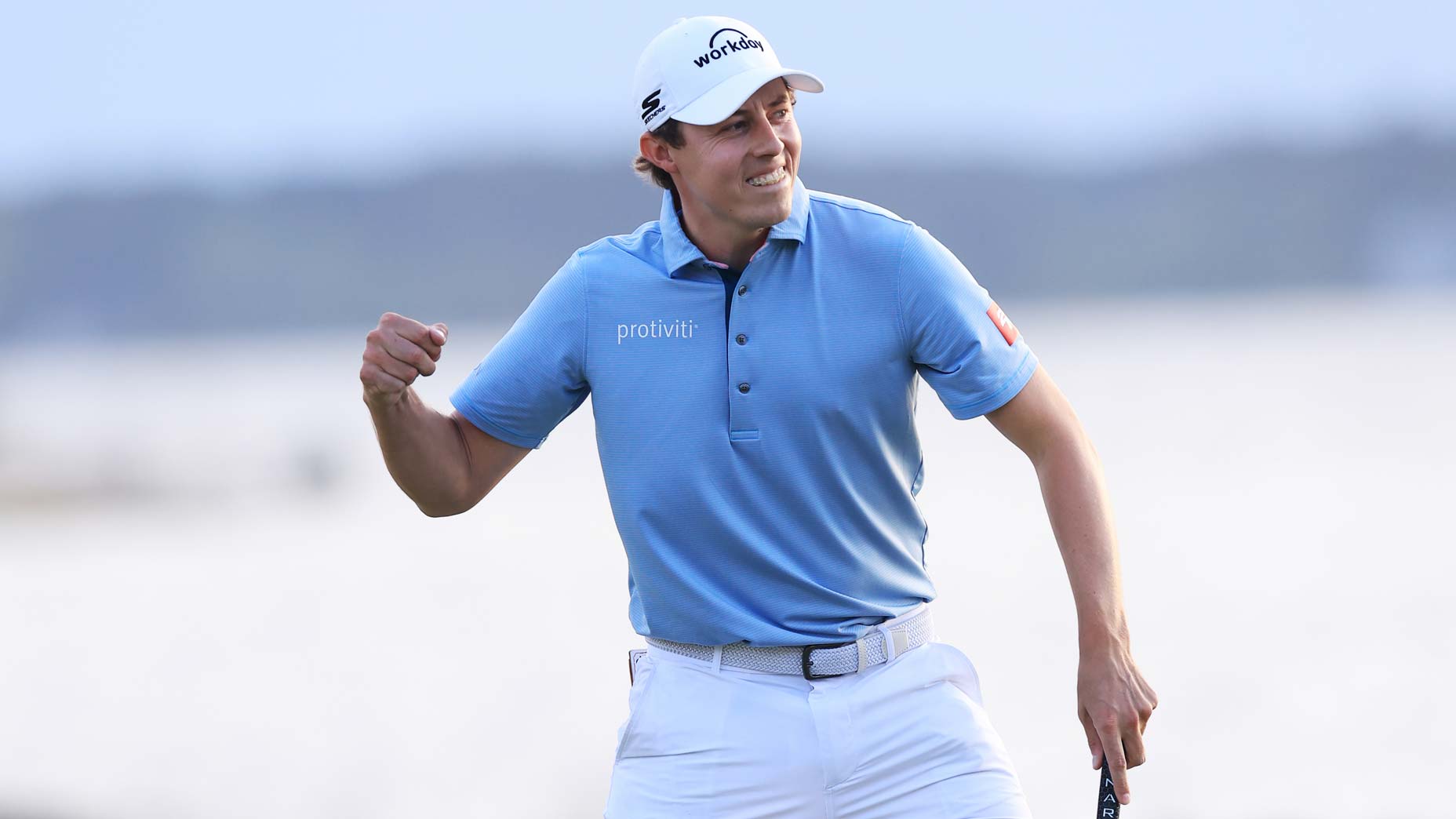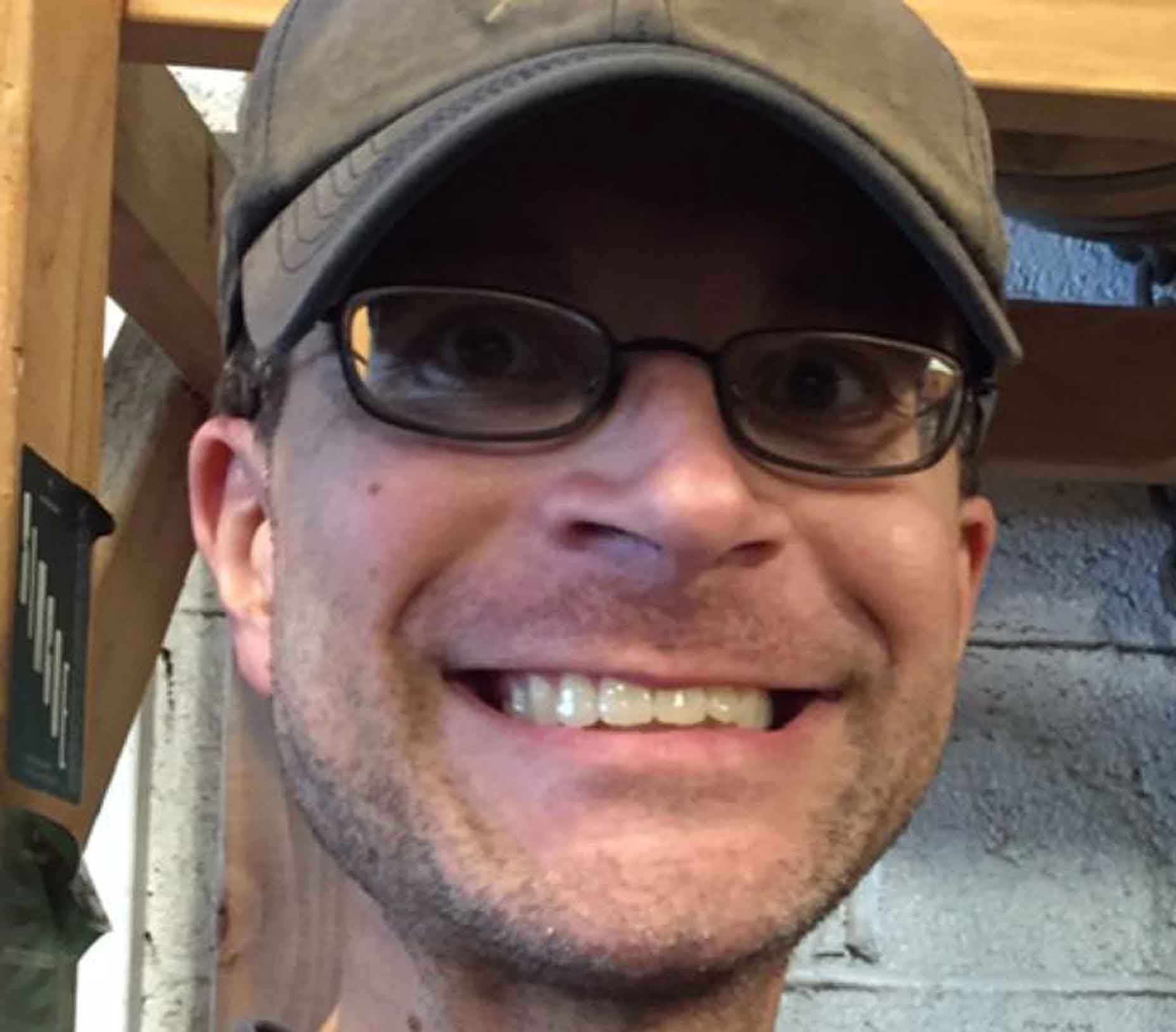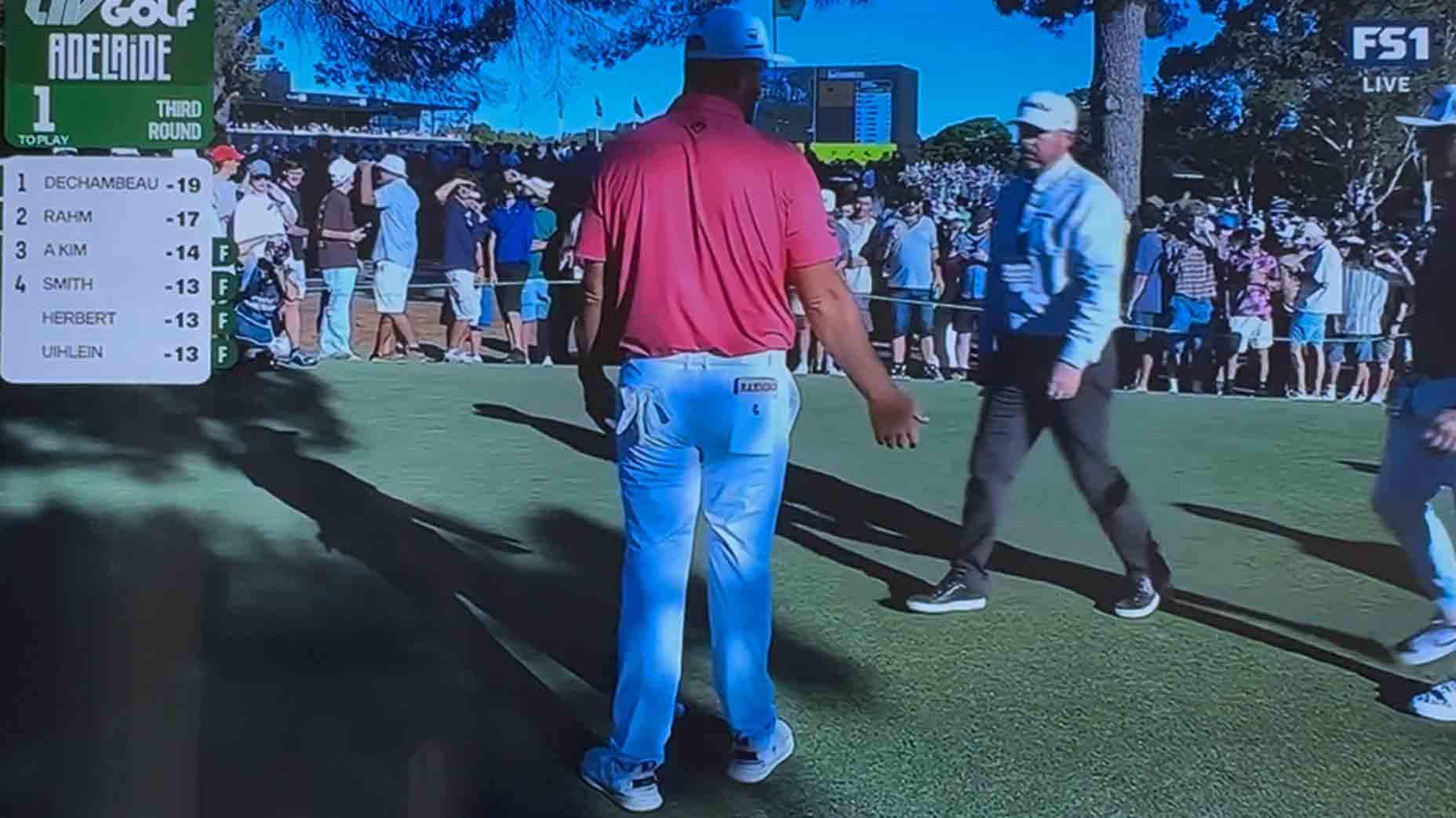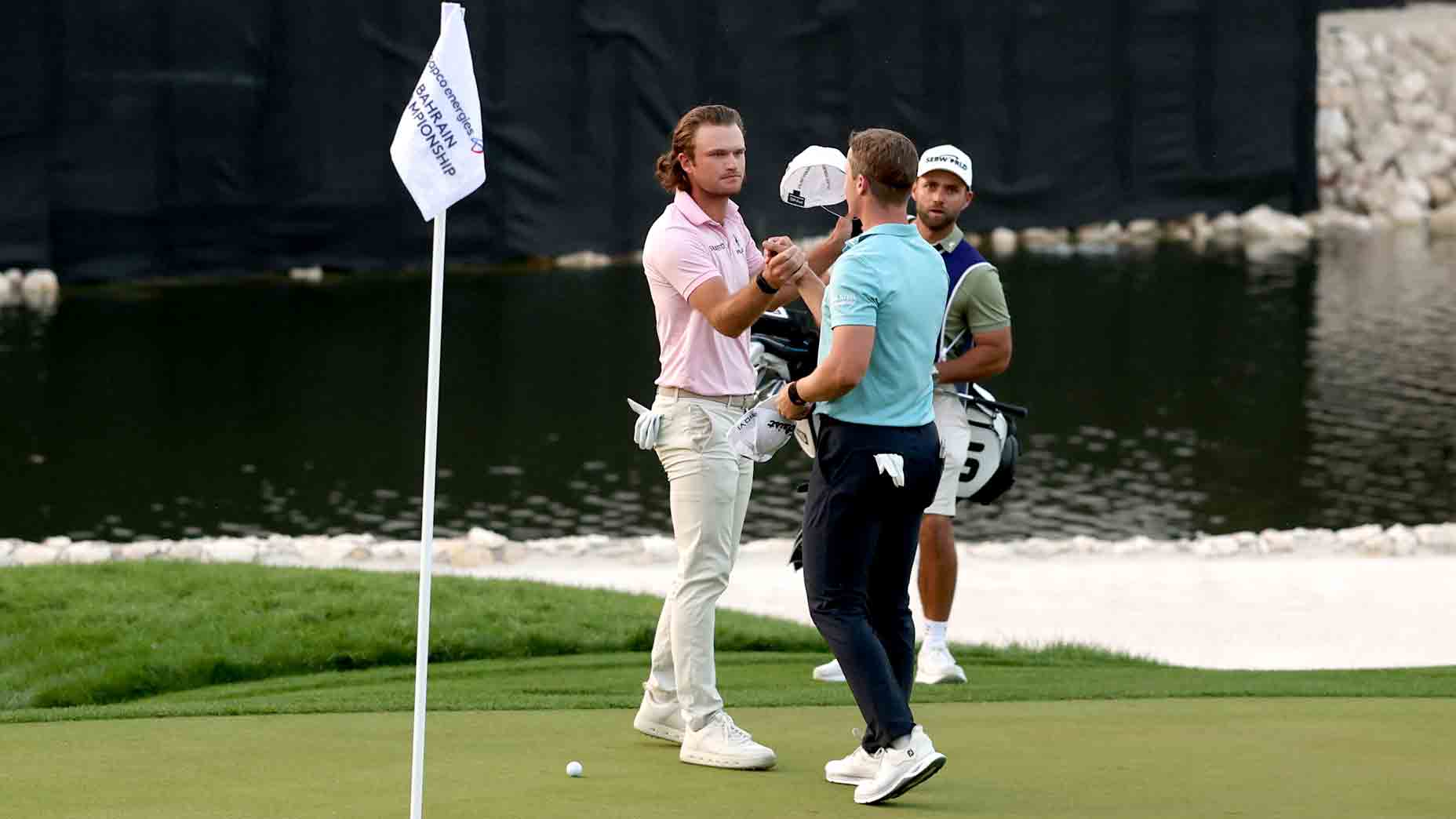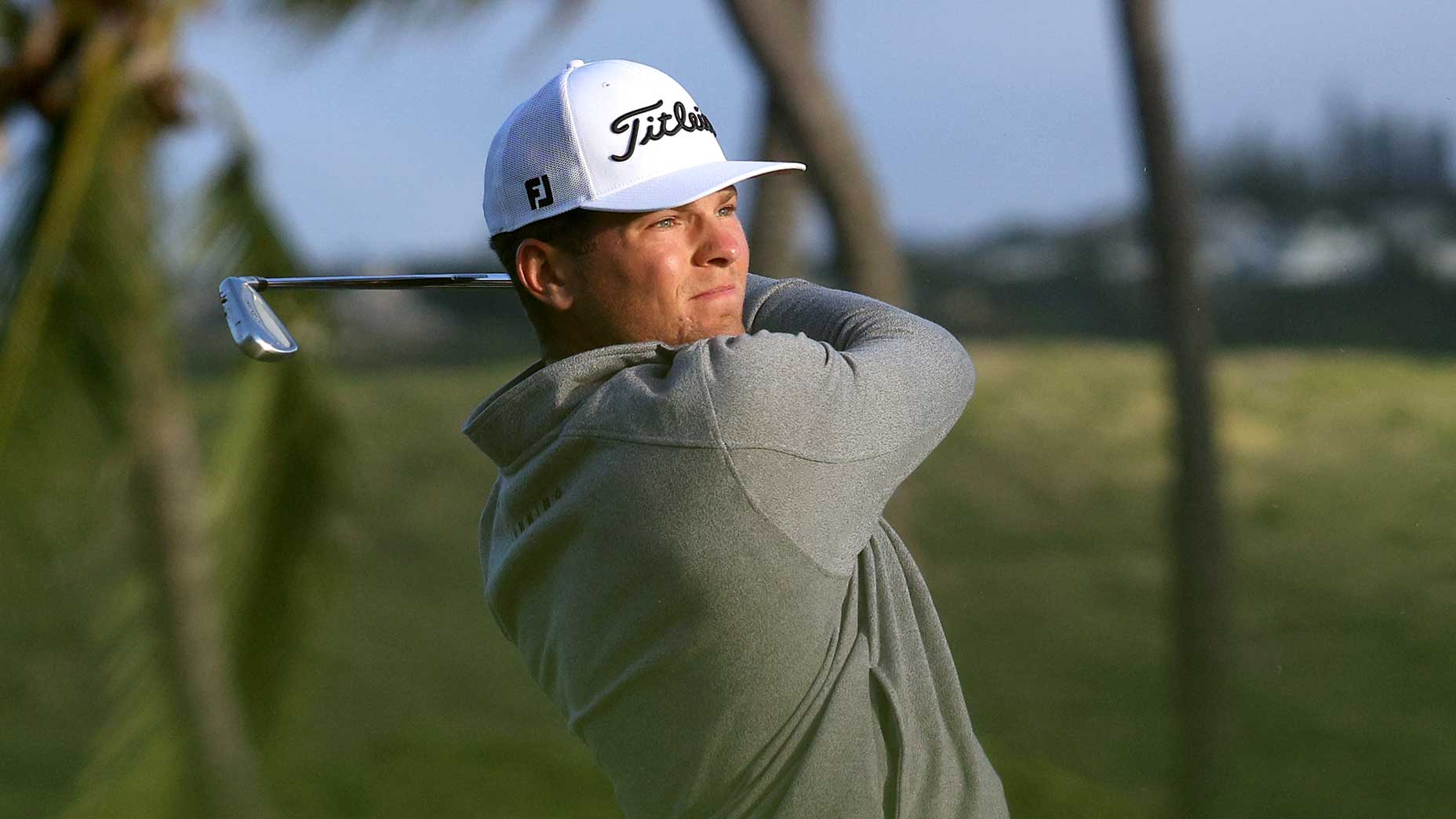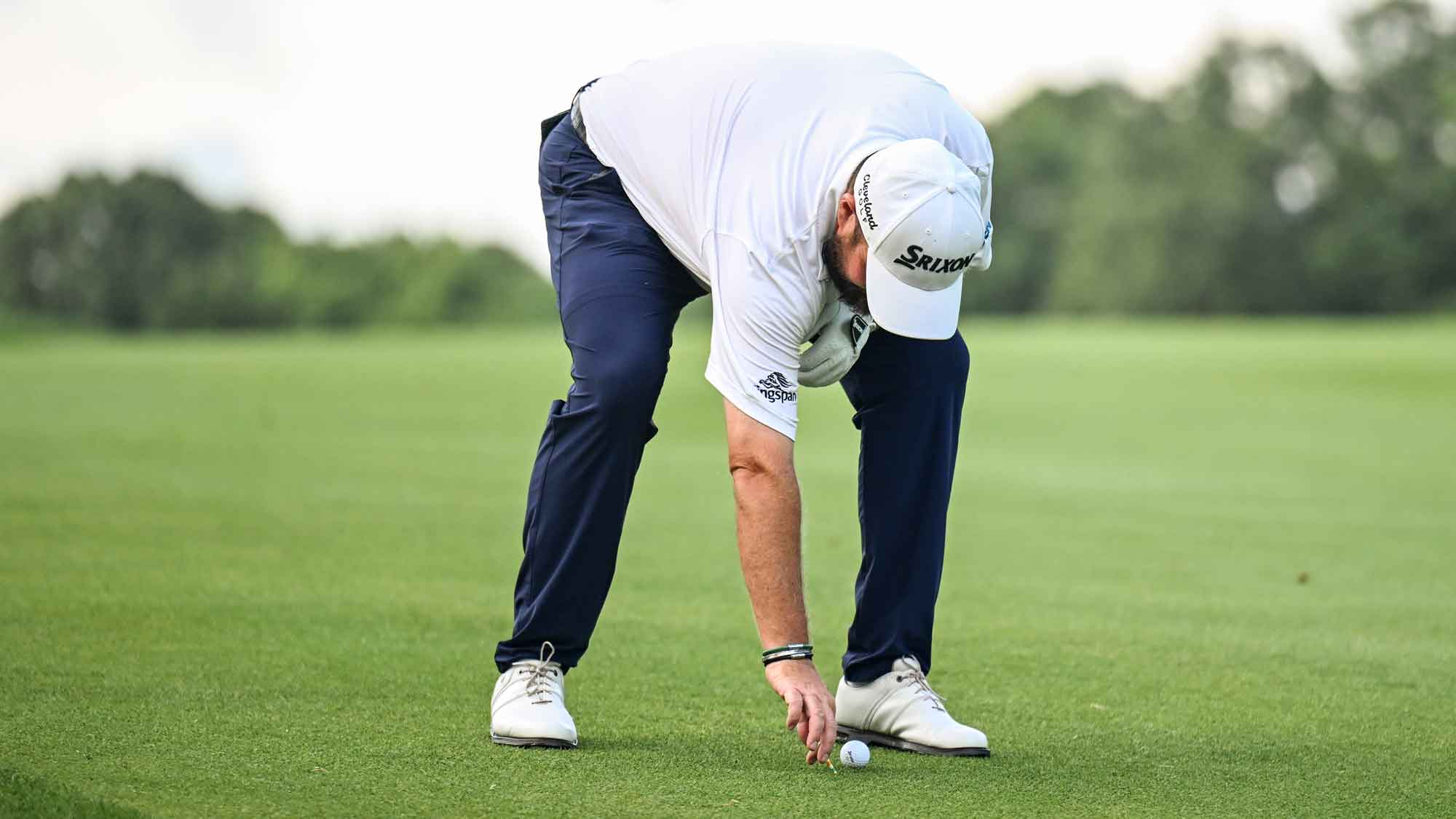He did what?
What would he do?
He did what?!?
And that’s the short way to describe one of the most engrossing golf moments you’ll see. In the end, after a mishit, after his ball settled between a wooden bulkhead and a wooden support post alongside water, after five minutes of debate on what to do, Patrick Cantlay bogeyed the 197-yard, par-3 14th at Harbour Town Golf Links during Sunday’s final round of the RBC Heritage.
But there were oh-so-many questions.
What happened ahead of it all?
Theater.
Cantlay was fighting, perhaps in a couple of ways. He was two back of leader Jordan Spieth. There were five holes to go. There was more. There was drama. Last week, Cantlay’s group was specifically called out for slow play during the Masters final round, and folks were piling on. Comments. Videos. Earlier in the round, when he backed off a putt, you could hear some boos. Cantlay had said he heard at least the original criticism, from Brooks Koepka. He defended himself. But a victory would be some much-needed offense.
On 14, after he and Spieth both hit just left of the green from the tee, Spieth nearly hit the delicate, speedy, left-to-right, downhill chip off the green and into water.
If Cantlay were to make his move — be it slowly or quickly — now was the time.
To help us along, we’ll use some words from the CBS broadcast and analysts Trevor Immelman, Ian Baker-Finch and Frank Nobilo. They were joined by Jon Rahm, who had just finished play, one week after winning the Masters — and his insight was maybe the biggest star of all this.
What happened next?
Disaster.
Your ball ends up here …
— PGA TOUR (@PGATOUR) April 16, 2023
Take a drop or play it as it lies? pic.twitter.com/HvT4PwlkO8
Cantlay hit his ball out toward the left, about 20 feet from the hole. It trickled left to right. It rolled past the hole.
It stopped short of the water. It somehow settled between the wooden support post and the wooden bulkhead that were to the right of the green. About a quarter of the ball was unseen.
Can it happen? Sure. But now? Improbable.
Said Immelman: “Oh word.”
Said Baker-Finch: “Well, that’s exactly what we were talking about and how so quickly it can get away from you.”
Said Immelman: “That’s like basketball when the ball gets between the hoop and the backboard. That’s just wedged in there.”
Said Baker-Finch: “I doubt he can play that. I don’t think he will.”
The questions multiplied, though to watch it unfold was gripping.
With ‘vote of confidence’ rules gesture, Scottie Scheffler rescues bewildered proBy: Nick Piastowski
What could have gone wrong at this point?
A lot.
The ball could have stayed stuck.
The ball could have popped up — and went straight down.
The ball could have trickled to the left or to the right.
Or something totally else. Could he have fallen in the water? Also a possibility. These things don’t happen often. You don’t practice this.
Said Immelman: “Because it’s sitting down, if he goes in and hits it, it might kick backwards and then drop down into the water.”
Could Cantlay have taken a drop?
You bet.
The ball had crossed the red-lined penalty area, and, for one penalty stroke, he could take stroke-and-distance, back-on-the-line or lateral relief, all under Rule 17.1d.
Said rules official Mark Dusbabek on the CBS broadcast: “It is in the penalty area. So his options are either to try and play it, which you don’t know what’s going to happen with the bulkhead. Otherwise, you can take relief and take his reference point from where he last crossed the margin of the penalty area.”
What did the analysts think Cantlay should have done?
Pro’s interview gesture earns ‘mad respect’ from golf fans, CBSBy: James Colgan
Drop!
Try to make your bogey. Move on.
Avoid the blowup.
Said Baker-Finch: “Yeah, it’s wedged in there. And my fear is if he bellies it to try and hit the ball cleanly, it pops up in the air and spins back into the water. I would not be playing that. I would certainly be dropping that over the edge and hopefully hole the putt for four.”
Immelman wondered, though, about Cantlay’s position in the tournament. He had started the hole two back of Spieth, who was leading and was facing a par putt.
Said Immelman: “Put yourself in his shoes here. If you’re two behind and now you’re in this situation, are you going to take a bit more risk because you’re trying to keep pace with Spieth? What would your process be here?”
Said Rahm: “Nah, you can’t. Take a drop. Hopefully make a four. And try to go on a tear the last few holes. That’s all you can do.”
What did Jon Rahm think?
Drop!
Outside of the shot — and maybe even including it — Rahm’s time in the CBS booth was outstanding. Twice, he had said that Cantlay should take the drop.
What did he think was going through Cantlay’s head?
Jim Nantz denies Phil Mickelson Masters TV coverage ‘shadowban’By: James Colgan
Said Rahm: “It’s an awkward situation as a player. Because you want to have faith that you can get it down and give yourself the best chance to hopefully make a four. Your ego is almost taking a bit of a hit if you’re taking a drop on a par-3. I mean, he had a 7-iron in and you’re in this situation. It’s tough. It’s tough. I could see Adam [Hayes, his caddie], if this was me, really trying to talk me out of this one. Because as players, you want to believe you can get this done and put it on the green. If he just hits past the hole, it will come right back and give himself a great look at four. But again, like I said, the dangers are great. I mean you have the board that’s wedged in. You have the edge of the green or the fringe. It’s massive risk over something you never practice. There’s too many unknowns in this situation.”
What was Jordan Spieth doing?
Watching.
Pacing.
After Cantlay’s first chip, Matt Fitzpatrick, the other player in the threesome, putted, and Spieth then waited.
Cantlay’s ball settled at 4:54 p.m. ET, and he didn’t hit again until 4:59. The slow-play narrative wasn’t being helped.
What did Cantlay do?
He hit!
He hit?
He put his iron behind the ball multiple times. He talked with caddie Matt Minister. Cantlay wondered if his ball would go backward on impact. He squatted down to take a closer look at the lie. Minister squatted down and looked underneath the post. Minister talked about where Cantlay could drop.
Cantlay took a slightly open stance. Both of his heels were above the water.
Said Immelman: “You got to watch out for the double hit here.”
Matt Fitzpatrick beats Jordan Spieth in playoff, wins RBC Heritage on familiar turfBy: Jack Hirsh
Said Rahm: “You got to watch out for a lot of things.”
Cantlay hit.
The contact made a clicking sound.
The ball dropped just on the edge of the green, and it rolled 4 feet past the hole.
Wild.
What was Rahm’s and the analysts’ reaction?
Stunned.
Said Immelman: “Oh yeah.”
Said Rahm: “Incredible.”
Said Baker-Finch: “Well, glad he went for it now. Just popped out of there nicely. I wasn’t expecting that, I must say.”
Said Rahm: “I wasn’t either. I mean, everything we said, just nothing.”
Said Immelman: “Welcome to being an announcer, Jon.”
Said Baker-Finch: “Welcome to our world.”
Said Rahm: “Oh, I don’t like it at all.”
Well played, @Patrick_Cantlay 👏 pic.twitter.com/i9LLurtFYi
— PGA TOUR (@PGATOUR) April 16, 2023
What did Cantlay think?
Despite the doubts, he was assured.
Afterward, he was asked: “Did you waver a few times to drop it, or you were going to hit it all the way and just needed to know how you were going to play it?”
Said Cantlay: “I just needed to make sure I was totally committed to what I decided to do there. I wasn’t decided until the end, but ultimately I thought that if I would have dropped it, it would have meant double bogey more than likely, and I wanted to at least give myself a chance to stay in the golf tournament and try and get it up-and-down, which I did.”
What happened after the shot?
In the end, after a mishit, after his ball settled between a wooden bulkhead and a wooden support post alongside water, after five minutes of debate on what to do, after a miracle, Cantlay finished third.
On 14, he made the bogey putt, after Spieth bogeyed too. Heading to the 15th hole, Spieth led, by a shot over Fitzpatrick, and by two over Cantlay, Xander Schauffele and Sungjae Im. From there, Spieth and Fitzpatrick tied after regulation play, Cantlay finished a shot back, and Fitzpatrick won after three playoff holes.
Said Rahm: ”That is a gutsy play right there that obviously if he goes on to win, we’re going to talk about it for a while.”
